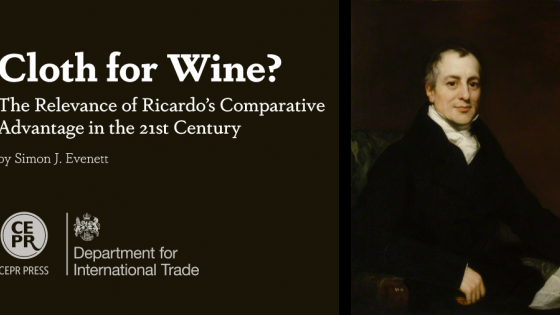Fundamentally, international commerce allows the consumption of goods and services in locations that differ from where they were designed, produced, or distributed. How much poorer, less entertained, and unhappy would we be if the only things we could consume were those produced close by? Greater variety, lower prices, and the many benefits of competition flow once production location can be divorced from the place of consumption.
Download the new eBook here:
Understanding where goods and services are produced, given the lure of alternative locations at home and abroad and the frustrations and impediments to operating at a distance from buyers, is a central societal question with implications not just for employment and the standard of living, but also for the level and growth of national income. Who gains and who loses from the technological and policy factors that alter how close producers need to be consumers are also of interest, not least as the fortunes of nations wax and wane as they inevitably do over time.
These are matters of longstanding interest to statesmen and women as well as to analysts, business people, civil society, and trade unions. They have also been acute sources of controversy, whether it be during the last US presidential election, the so-called globalisation backlash witnessed in some countries at this time, or the great debate over the repeal of the Corn Laws in the 1840s. Not surprisingly, then, some of the great minds of each generation have thought about the causes and consequences of international commerce.
Step forward Ricardo
David Ricardo made one of the enduring contributions to the analysis of international trade with the publication in 1817 of his On the Principles of Political Economy and Taxation. In addition to putting forward what was to become known as the Principle of Comparative Advantage, in this treatise Ricardo analysed the effects of import tariffs and subsidies (“bounties”, as he called them) on resource allocation, trade, and the level of profit; the impact of shocks to international trade; and the terms upon which the UK traded with its colonies.
Economists and social scientists have not retained all of Ricardo’s method or conclusions. His theory of the distribution of income would, for example, be unrecognisable in the 21st century to students of economics that consulted leading textbooks and doctoral course reading lists. Yet, his explanation why specialisation pays in economies open to trade has been retained, confirmed, and extended in modern economic analysis (see Jonathan Eaton’s chapter in the eBook).
Ricardo put forward a simple and compelling example that showed why two nations would trade cloth for wine and why both would benefit from that trade, even if one nation maintained a productivity edge over the other in the production of both goods. Some object to the simplicity as being unrealistic but, as Richard Baldwin argues in his chapter of this eBook, Ricardo simplified to clarify. And with it the implication that it is comparative cost advantages – rather than absolute cost advantages – that matter.
Contemporary relevance?
Still, there is the question of whether the Principle of Comparative Advantage remains relevant in the 21st century. In an age when services are traded not just goods, when data, ideas, and technology flow across borders, and when firms have organised production into tasks that can be located in different nations (Grossman and Rossi-Hansberg 2006, 2008), one is entitled to ask if an example designed to highlight the determinants of physical goods trade remains the best organising framework for analysis?
Several of the chapters of the eBook specifically address the question of contemporary relevance. While many authors cogently argue that the Principle remains relevant, there are interesting cases where this may not be so (see, in particular, the chapter by Alan Deardorff.) Interestingly, where there are doubts concerning the predictions of the Principle of Comparative Advantage, they relate to the direction of trade as opposed to the gains from trade.
Indeed, Ricardo’s trenchant defence of free trade and his corresponding opposition to protectionism stands out at the present time when more and more question the benefits of cross-border movement of goods, services, people, investments, and ideas. Well before the populist backlash against globalisation and against the negotiation of more free trade agreements – such as the Transatlantic Trade and Investment Partnership and the Trans-Pacific Partnerships – took hold in certain Western nations, governments were already discriminating more frequently against foreign commercial interests. Just because the world trade has not collapsed as it did in the 1930s does not mean that beggar-thy-neighbour policies are not flourishing in what has become a heavily distorted world trading system (see one of my chapters for evidence). Ricardo’s message may be heard but it is certainly not being acted upon often enough. Ernesto Zedillo’s chapter in the eBook is a shot in the arm for those seeking to counter populists and advance the cause of free trade.
Rethinking the case for trade liberalisation
Making reference to cutting-edge research findings, several contributors to this eBook revisit the costs and benefits of trade reform. As Swati Dhingra points out, we now have a much better understanding of the many different ways in which trade benefits societies and the size of those benefits. In light of a growing body of analysis of the impact of China’s integration into the world economy since it joined the WTO in 2001, we also have a much better sense of the human cost that follows from international trade (see the chapter by Justin Pierce and Peter Schott).
These costs, mainly felt in local labour markets that have been found to respond much more slowly than many analysts originally thought, are referred to drily in the trade policy literature as adjustment costs. Such technocratic garb does nothing to blunt the political impact of the costs associated with the profound shifts in economic heft in the world economy. It is an interesting question as to the extent to which support for further trade reform in high-income nations will depend on governments’ ability to fix their local labour markets. The Achilles’ heel of free trade may well be flawed policies at home rather than the foul deeds of our trading partners.
However, a rejection of trade agreements and the WTO need not be a rejection of Ricardo’s principal policy recommendation on commercial policy. Arguably, in his Principles, Ricardo made the case for unilateral trade reform. So is Ricardo off the hook? Maybe not. As Alan Winters argues in his contribution to the eBook, in an age of cross-border supply chains, the case for unilateral trade reform weakens as compared to that of reciprocity-based approaches to opening markets. And so, once again, the relevance of Ricardo’s insights are re-evaluated in the light of contemporary circumstances.
Standing on the shoulders of giants
But expecting enduring relevance over centuries is asking too much of any author. After all, who can accurately predict that far into the future? Isaac Newton once wrote to a rival that “If I have seen a little further it is by standing on the shoulders of giants.” Ricardo was such a giant and it is testament to the enduring value of his insights that they remain the starting point for contemporary analysis of the world trading system.
Given the overall goal of this volume is to assess the contemporary relevance of Ricardo’s writings on international trade on the 200th anniversary of the publication of his Principles, the contributions in this volume have been organised around three themes: our contemporary understanding of Ricardo’s insights and the manner in which they have been developed by researchers in recent years; the relevance of Ricardo’s analysis in a world trading system far different from one where cloth was exchanged for wine; and the contemporary relevance of Ricardo’s policy recommendations as they relate to rejecting protectionism in favour of unilateral free trade.
References
Grossman, G and E Rossi-Hansberg (2006), “The rise of offshoring: it is not wine or cloth any more”, in The New Economic Geography: Effects and Policy Implications, Jackson Hole Conference Volume, Federal Reserve of Kansas City, August, 59-102.
Grossman, G and E Rossi-Hansberg (2008). “Trading tasks: a simple model of offshoring”, The American Economic Review, 98, 1978-1997.



